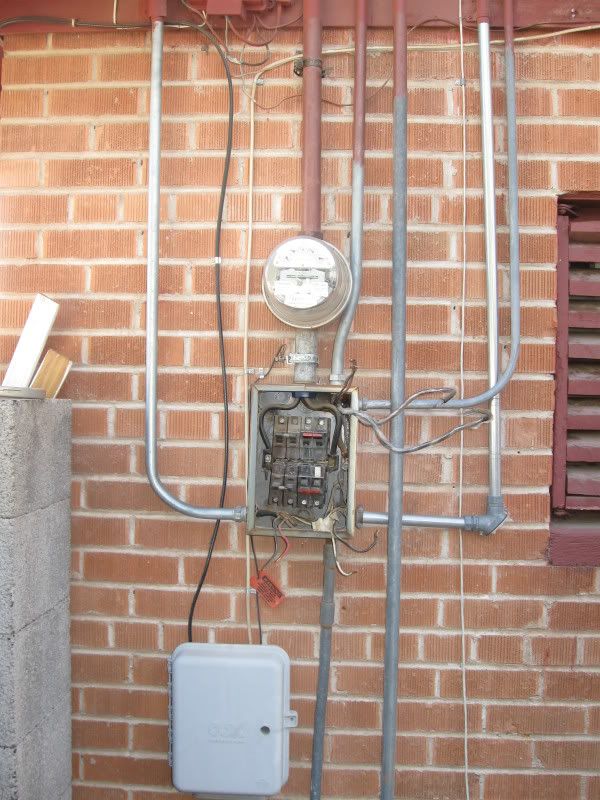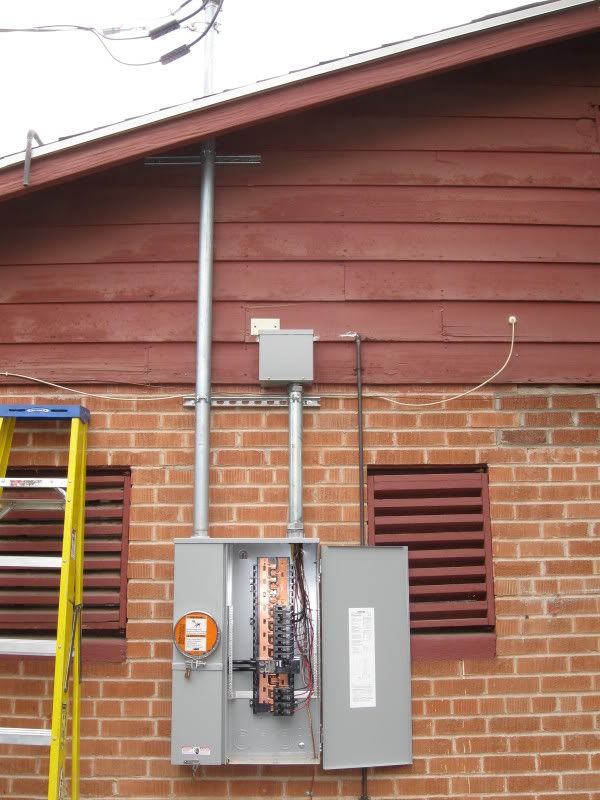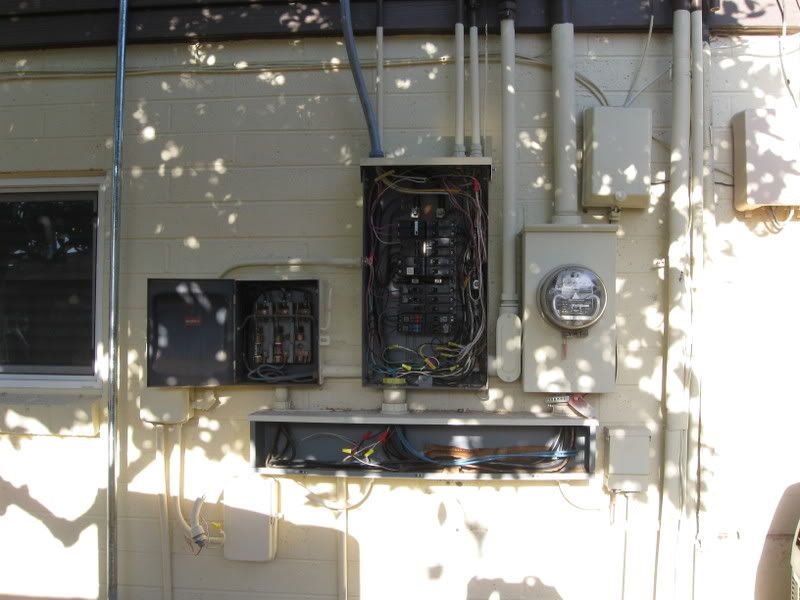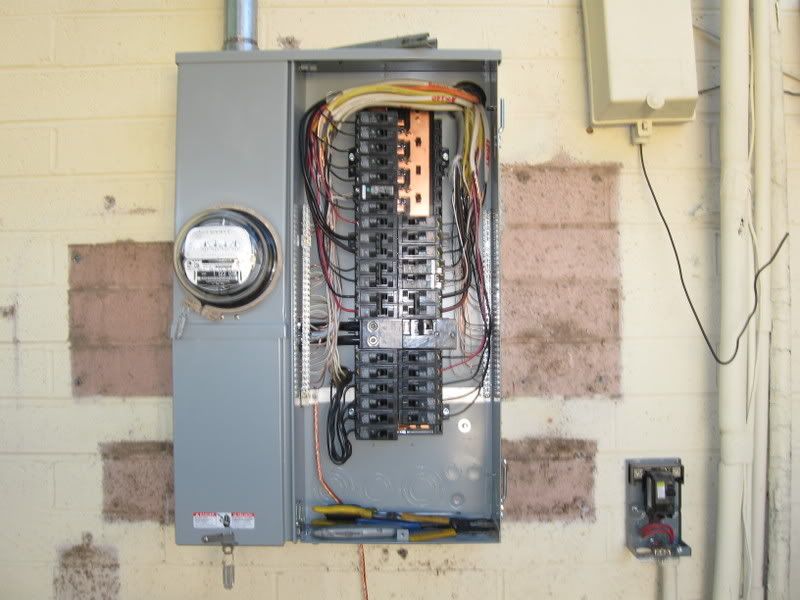How many of you change a residential 100-200a overhead service hot? In other words, splice onto the power company's drop hot? Or do you call the power company, wait for them to come out and disconnect it, and then wait for them when its time for them to reconnect? Just curious.
You are using an out of date browser. It may not display this or other websites correctly.
You should upgrade or use an alternative browser.
You should upgrade or use an alternative browser.
Changing a service hot
- Thread starter JohnME
- Start date
- Status
- Not open for further replies.
ibuildpower
Member
Reply to hot service change
Reply to hot service change
I do them hot.
Reply to hot service change
I do them hot.
Rewire
Senior Member
- Location
- Lake of the Ozarks
Never work hot.The POCO does all cut outs.
- Location
- Windsor, CO NEC: 2017
- Occupation
- Service Manager
From a convenience standpoint, it would kind of depend on the job, wouldn't it?
From a safety standpoint, utterly unacceptable, isn't it?
From a safety standpoint, utterly unacceptable, isn't it?
al hildenbrand
Senior Member
- Location
- Minnesota
- Occupation
- Electrical Contractor, Electrical Consultant, Electrical Engineer
In my area, the PoCo won't make the permanent connections at the point of service until they receive the OK from the local electrical inspector for the service. This means they generally turn a blind eye to our temporary hookups of laterals and drops.
roger3829
Senior Member
- Location
- Torrington, CT
Always hot.
busman
Senior Member
- Location
- Northern Virginia
- Occupation
- Master Electrician / Electrical Engineer
Around here, the PoCo won't let us do the connections. I wish they would. We tap the old SE conductors to the new SE conductors using bugs and feeding through the meter hole in the meter can. Then the PoCo comes later (sometimes months later) and does the final hook-up in the meter and replaces the drop (if they think it needs it). They then steal your 3 bugs and your section of SE cable for scrap and go on their way.
Mark in the Commonwealth of Virginia
Mark in the Commonwealth of Virginia
- Location
- Illinois
- Occupation
- retired electrician
What provison of the OSHA rules permit electricians to make these connections hot?
busman
Senior Member
- Location
- Northern Virginia
- Occupation
- Master Electrician / Electrical Engineer
Don,
I'm sure there isn't one. In my case, I'm not an employee so OSHA doesn't apply to me. If the PoCo would let me do hook-ups, I would. I know rules are important, but I don't see where it makes a difference what your "title" is. I don't see why we have rules that say if you are a "lineman" you can, if you're an "electrician" you can't. The rules of physics apply equally to everyone.
I'd say that thanks to this forum, I'm in much less danger than a lineman doing the same job. I've seen lineman pull meters bare-handed with a cotton t-shirt. I've seen them pull a loose 4/0 service entrance conductor right out of a residential panel bare-handed. In fact (and let the flaming begin), that electricians may be the safer of the bunch. The lineman I've encountered are so used to working with really high voltages, that they usually treat 120V like we electricians treat phone wires. "Might give me a jolt, but nothing to worry about." When I work things hot, I at least wear the proper PPE.
Just one man's experience/opinion.
Mark
I'm sure there isn't one. In my case, I'm not an employee so OSHA doesn't apply to me. If the PoCo would let me do hook-ups, I would. I know rules are important, but I don't see where it makes a difference what your "title" is. I don't see why we have rules that say if you are a "lineman" you can, if you're an "electrician" you can't. The rules of physics apply equally to everyone.
I'd say that thanks to this forum, I'm in much less danger than a lineman doing the same job. I've seen lineman pull meters bare-handed with a cotton t-shirt. I've seen them pull a loose 4/0 service entrance conductor right out of a residential panel bare-handed. In fact (and let the flaming begin), that electricians may be the safer of the bunch. The lineman I've encountered are so used to working with really high voltages, that they usually treat 120V like we electricians treat phone wires. "Might give me a jolt, but nothing to worry about." When I work things hot, I at least wear the proper PPE.
Just one man's experience/opinion.
Mark
I would still do it if allowed but they seriously frown on it here.
It would make my job a LOT easier if I could disconnect/reconnect.
I have to get there early to drive ground rods, then haul ass to get it ready for city and POCO approval. Unless it's a real easy one, I am not done until about 2-3 PM and the inspectors show up at will, sometimes before noon.
I have one scheduled for tomorrow and it's getting HOT here.
It would make my job a LOT easier if I could disconnect/reconnect.
I have to get there early to drive ground rods, then haul ass to get it ready for city and POCO approval. Unless it's a real easy one, I am not done until about 2-3 PM and the inspectors show up at will, sometimes before noon.
I have one scheduled for tomorrow and it's getting HOT here.
busman
Senior Member
- Location
- Northern Virginia
- Occupation
- Master Electrician / Electrical Engineer
I would still do it if allowed but they seriously frown on it here.
It would make my job a LOT easier if I could disconnect/reconnect.
I have to get there early to drive ground rods, then haul ass to get it ready for city and POCO approval. Unless it's a real easy one, I am not done until about 2-3 PM and the inspectors show up at will, sometimes before noon.
I have one scheduled for tomorrow and it's getting HOT here.
You can do a heavy-up (alone) and be done by 2 PM. That's seriously fast. My hard-hats off to you.
Mark
J.D. Electric
Member
- Location
- Philly PA
we do it hot here in philly
You can do a heavy-up (alone) and be done by 2 PM. That's seriously fast. My hard-hats off to you.
Our service/panels are outside here so in some ways it is easier.
If there has been a ton of crap added over the years, it gets a little more difficult.
This was done by 2PM


This one took till 6PM but I was able to schmooze both inspectors into green tags at noon.


SiddMartin
Senior Member
- Location
- PA
we always disconnect, then re-connect hot, PPE ofcourse
MrMilbank
Member
- Location
- between LB and Head
220/221 what type of connectors did you use for the conductors coming in? I use split bolts and what you have looks easier/faster.
peter d
Senior Member
- Location
- New England
Both of the poco systems I am familiar with, National Grid (Squid) and Northeast Utilities allow (and in fact encourage) the electrician to make up the connection. You need to be licensed and obtain a permit/inspection to do so, but many times this is not done.
As for Don's question about OSHA rules allowing this, obviously there are none, but what are you supposed to do when your poco had handed this task off to the electrician? :-?
As for Don's question about OSHA rules allowing this, obviously there are none, but what are you supposed to do when your poco had handed this task off to the electrician? :-?
- Status
- Not open for further replies.


